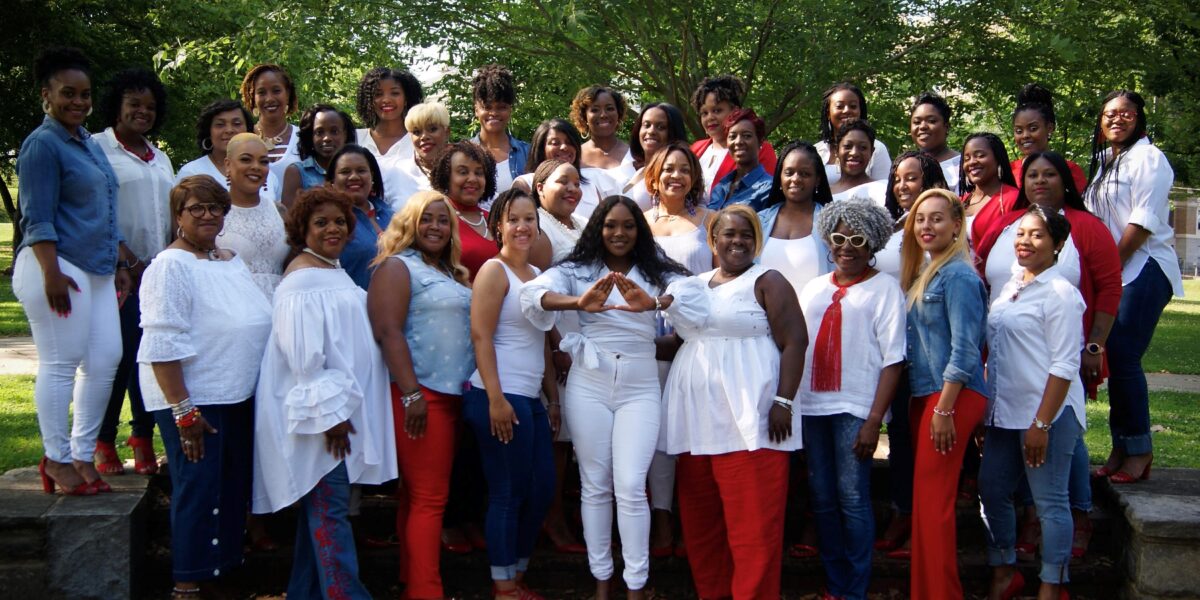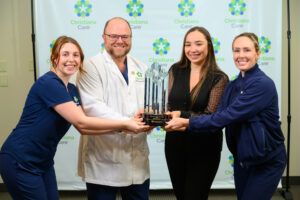Whenever Jennifer Johnston, MA, APR, senior communications manager, slips on her Alpha Kappa Alpha Sorority, Inc. jacket, she knows there’s a good chance she’s going to make at least one new friend. The eye-catching apple green and salmon pink combination never fails to draw the attention of a fellow sorority sister, whether she’s in line at the grocery store, having lunch or just getting out of her car.
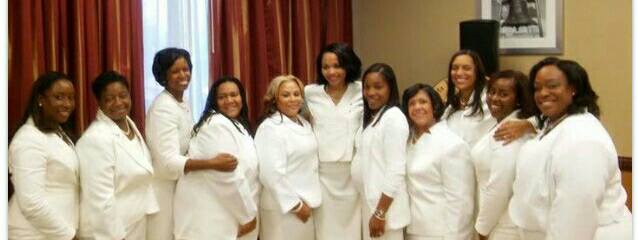
“Once I was on a plane, and the woman behind me noticed we each had on an AKA pin. We ended up talking the whole plane ride,” said Johnston, who joined Alpha Kappa Alpha Sorority, Inc., seven years ago, continuing a tradition started by her great aunt.
“At ChristianaCare I’ve had people that I didn’t even know were AKAs just strike up a conversation with me. It gets people talking.”
That instant connection is just one of the many benefits of being part of the Divine Nine.
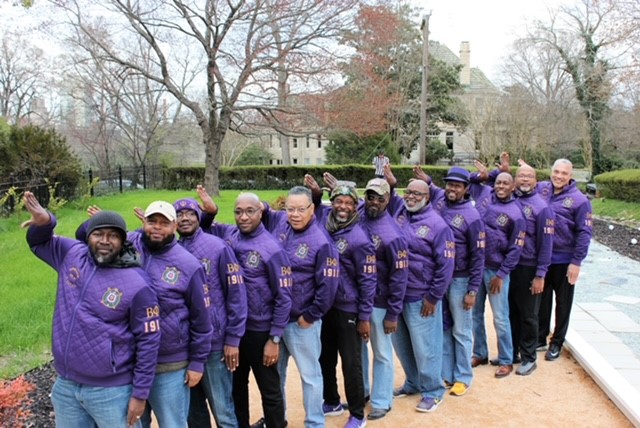
The Divine Nine
Alpha Kappa Alpha Sorority, Inc.
Alpha Phi Alpha Fraternity, Inc.
Delta Sigma Theta Sorority, Inc.
Iota Phi Theta Fraternity, Inc.
Kappa Alpha Psi Fraternity, Inc.
Omega Psi Phi Fraternity, Inc.
Phi Beta Sigma Fraternity, Inc.
Sigma Gamma Rho Sorority, Inc.
Zeta Phi Beta Sorority, Inc.
Alpha Kappa Alpha Sorority Inc., is one of nine Black Greek letter organizations first founded on college campuses to offer support and service opportunities for African American students during a time when many were excluded from Greek fraternity and sorority organizations at predominantly white institutions.
Over the years, these organizations, some more than a century old, have helped Black fraternity and sorority members develop strong community connections, increase their professional opportunities after college, and provide service to those in need.
More than 1.5 million people around the world are members of the Divine Nine. They can be found in all walks of life, including politics, entertainment, sports and higher education. Beyonce, Michael Jordan, Pulitzer-Prize winning author Toni Morrison, Vice President Kamala Harris and the late Supreme Court Justice Thurgood Marshall are among some of the more well-known fraternity brothers and sorority sisters.
These organizations — Alpha Phi Alpha Fraternity, Inc., Alpha Kappa Alpha Sorority, Inc., Delta Sigma Theta Sorority, Inc., Kappa Alpha Psi Fraternity, Inc., Omega Psi Phi Fraternity, Inc., Phi Beta Sigma Fraternity, Inc., Zeta Phi Beta Sorority, Inc., Sigma Gamma Rho Sorority, Inc., and Iota Phi Theta Fraternity, Inc. — are collectively known as the National Pan-Hellenic Council, also known as the Divine Nine. Alpha Phi Alpha Fraternity, Inc., is the oldest intercollegiate Black Greek organization, dating back to 1906, while Iota Phi Theta is the youngest, founded in 1963.
Unlike other Greek life organizations, the Divine Nine accepts members as undergraduates or graduate members. (Learn more about the history of the Divine Nine here.)
ChristianaCare counts several members of the Divine Nine among its caregivers. Read on to learn about some of our caregivers who are part of this storied tradition:
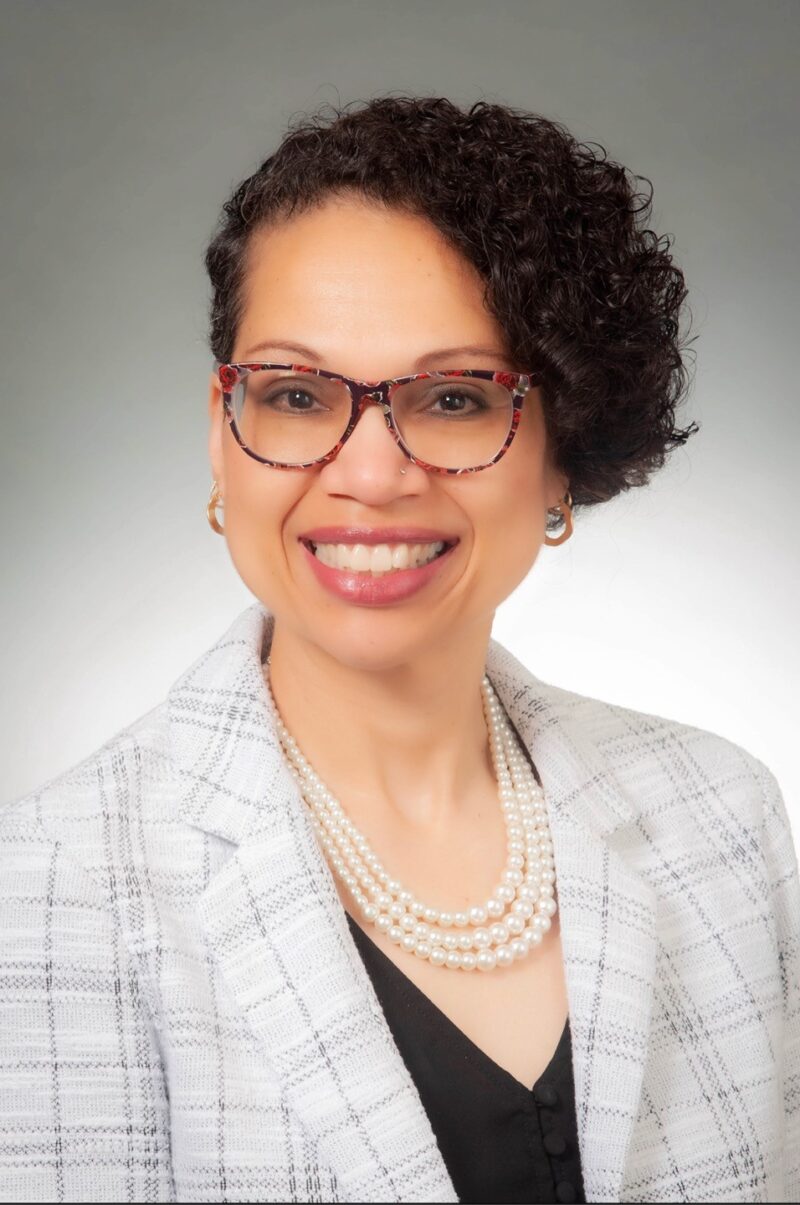
Gemma Lowery, MBA, CATC
Center for Virtual Health Technology Manager of Digital Solutions
Sigma Gamma Rho Sorority, Inc.
For Gemma Lowery, MBA, CATC, it was the Sigma Gamma Rho Sorority, Inc., motto — “Greater Service, Greater Progress” — that convinced her to join the University of Delaware Theta Omicron undergraduate chapter in 1987. She was drawn to the sorority’s strong history of helping others — an ideal she continues to live as a ChristianaCare caregiver.
“My sorority experience has allowed me to magnify both the effect and impact of what I can do as an individual and take it to a higher level. We are all each other’s keepers and service to others has always been a strong calling in my life. I believe that my work in service with the sorority makes me a much better caregiver and leader,” Lowery said.
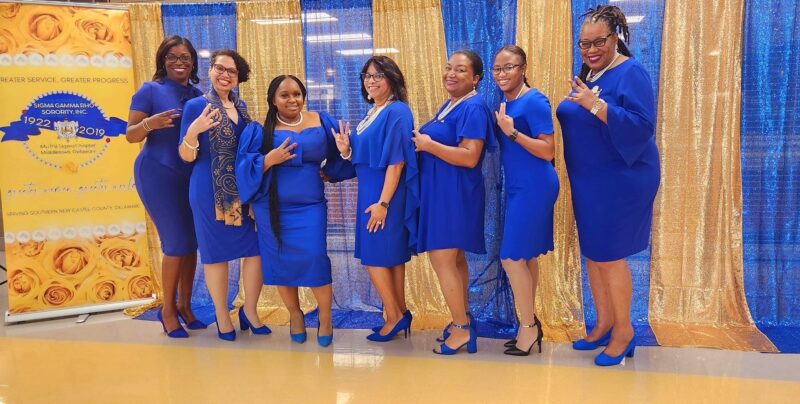
“I see many of life’s realities from different perspectives and have enormous empathy of those navigating difficult and sometimes very complex times. It makes me work that much harder to try and problem solve healthcare solutions that are inclusive and impactful for all.”
After finishing her undergraduate studies, Lowery transitioned to Alpha Nu Sigma graduate chapter and was one of the founding members of Eta Zeta Sigma alumni chapter the following year. She currently serves as the financial secretary (grammateus) of the Mu Psi Sigma alumni chapter in Middletown, Delaware. Lowery was the first person in her family to join a Divine Nine organization, but not the last. Her brother is a member of Alpha Phi Alpha fraternity.
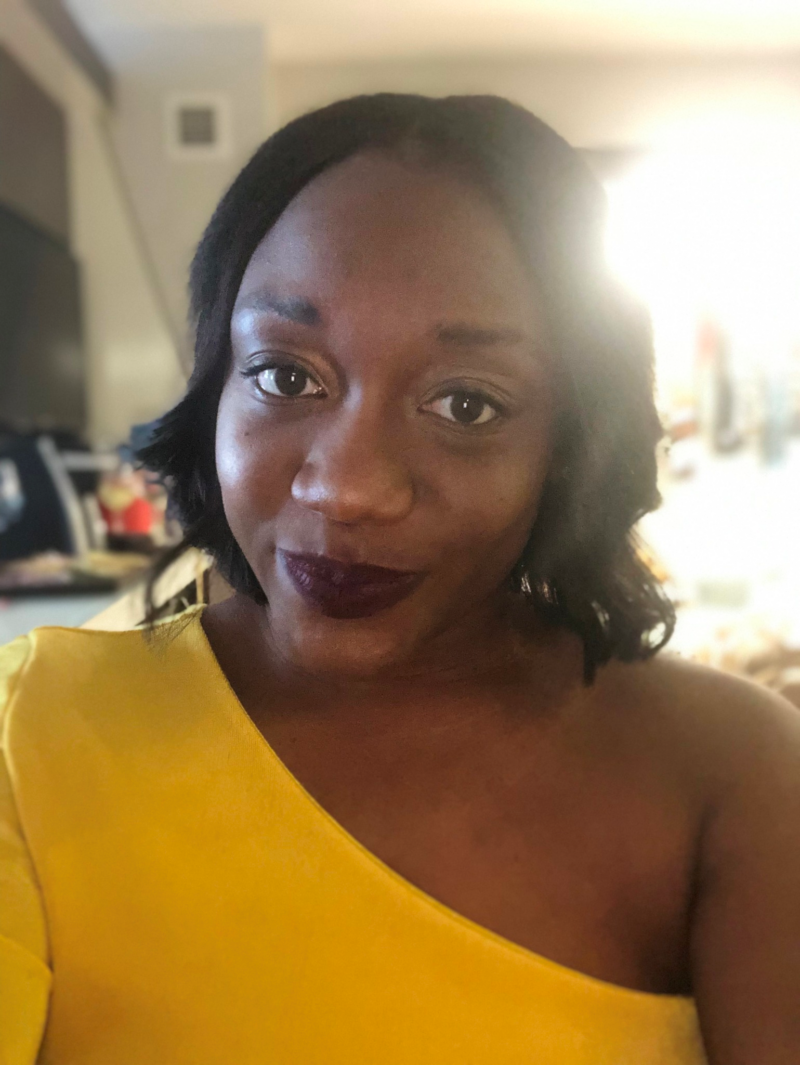
Bridget Peters, D.O., Ph.D.
Core Faculty, Family Medicine Residency Program, Family Medicine Center at Wilmington Health Center
Alpha Kappa Alpha Sorority, Inc.
Looking back on her youth, Bridget Peters, D.O., Ph.D., can see a notable similarity among her favorite schoolteachers, mentors and people in her church congregation. They are all members of Alpha Kappa Alpha Sorority, Inc. It’s a connection she now shares with them as a member of the oldest Greek letter organization founded by African American women. Peters crossed (moving up from being a pledge) as a member in 2014, while she was in graduate school at Auburn University.
“This is just a legacy of great African American women, who are leaders, who have gone to college and continue their education and now they are the head of companies and leading the country,” Peters said. “It’s a fascinating organization that stands on empowerment and sisterhood.”
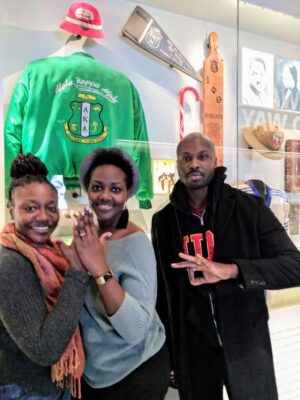
Feeling that camaraderie is especially important for Peters. Black Americans make up nearly 13% of the U.S. population, but Black women account for less than 3% of physicians, according to a 2021 study in the Journal of General Internal Medicine.
Knowing that she can always count on a familiar voice on the phone or a supportive text message means a lot for Peters, who grew up in South Carolina and attended the Edward Via College of Osteopathic Medicine at its South Carolina campus. It’s also why she returns the favor whenever she can, such as by talking with young sorority sisters who are medical students and residents navigating the first steps in their careers.
“The connection just continues to ebb and flow as you go through your walk of life. It’s very empowering to know that you will never be alone,” she said.
Like many members who have a family connection to the sorority, Peters was motivated to join AKA after her sister crossed. Being members of the same organization has only strengthened the bond between the two — who are not only sisters by blood, but in service as well.
“After I joined, she gave me her AKA line jacket to put on and we took pictures together to celebrate. We were already best friends and super close. But after I was able to join, it was like we had another facet that we could add to our sisterhood,” Peters said. “I have a niece and we already say that we have a little sister up and coming — even if she’s only two.”
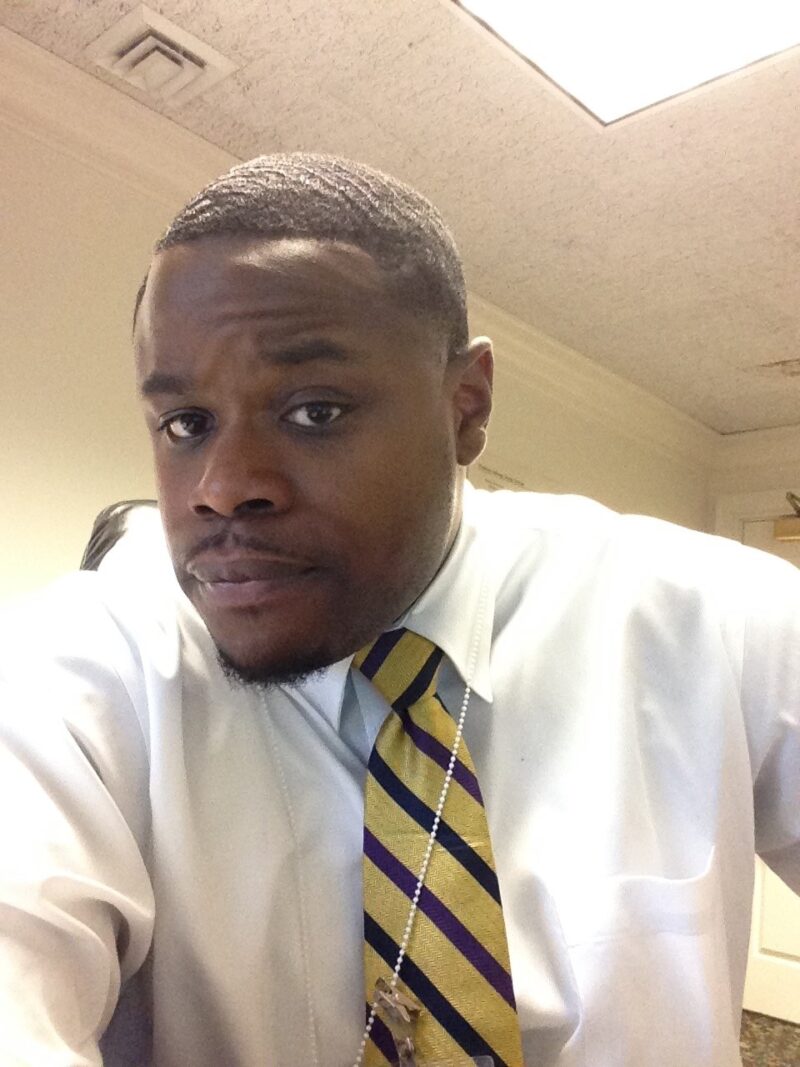
Jamal Williams, MHA
Employee Relations Specialist
Omega Psi Phi Fraternity, Inc.
Some things just make more sense when you’re older. Growing up, Jamal Williams, MHA, knew the men of Omega Psi Phi were active in his Baltimore, Maryland, community, but the meaning behind their service were something of a mystery to young Jamal.
It wasn’t until he was in college at Delaware State University that he began to understand the magnitude of what it meant to be part of a fraternal organization like Omega Psi Phi, founded in 1911 on the campus of Howard University.
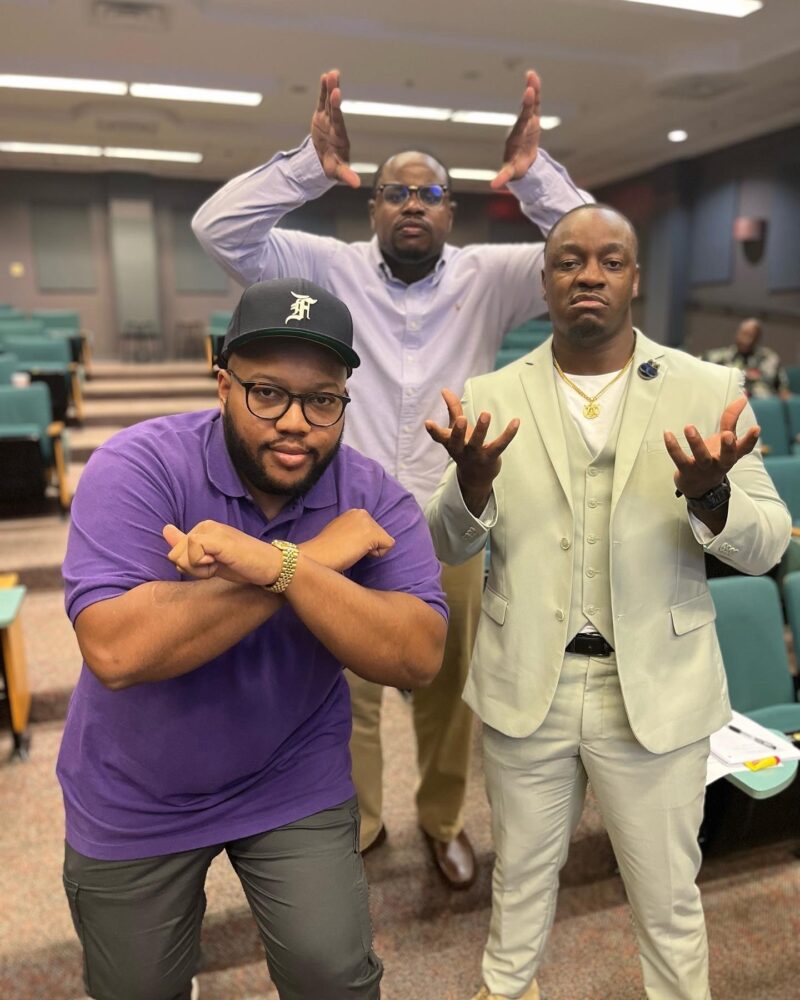
The organization’s Greek letters reflect the fraternity’s motto: “Friendship is essential to the soul.” Indeed, friendship and service are integral to being an Omega man. Although it’s been 15 years since Williams crossed as a member of the Psi Epsilon chapter at DSU, he remains connected to his fraternity brothers, both personally and professionally.
He’s currently affiliated with the Gamma Mu Nu, the graduate chapter of Omega Psi Phi serving Newark and Middletown, Delaware. Even at work he can find a few familiar Omega faces, including Marc Latta, DHSC, PA-C, an advance practice clinician in critical care/cardiac surgery.
“This organization of brothers was not just a college experience, but a lifetime commitment to friendship and being a positive example to young Black boys and men, all while leading and serving our community,” Williams said.
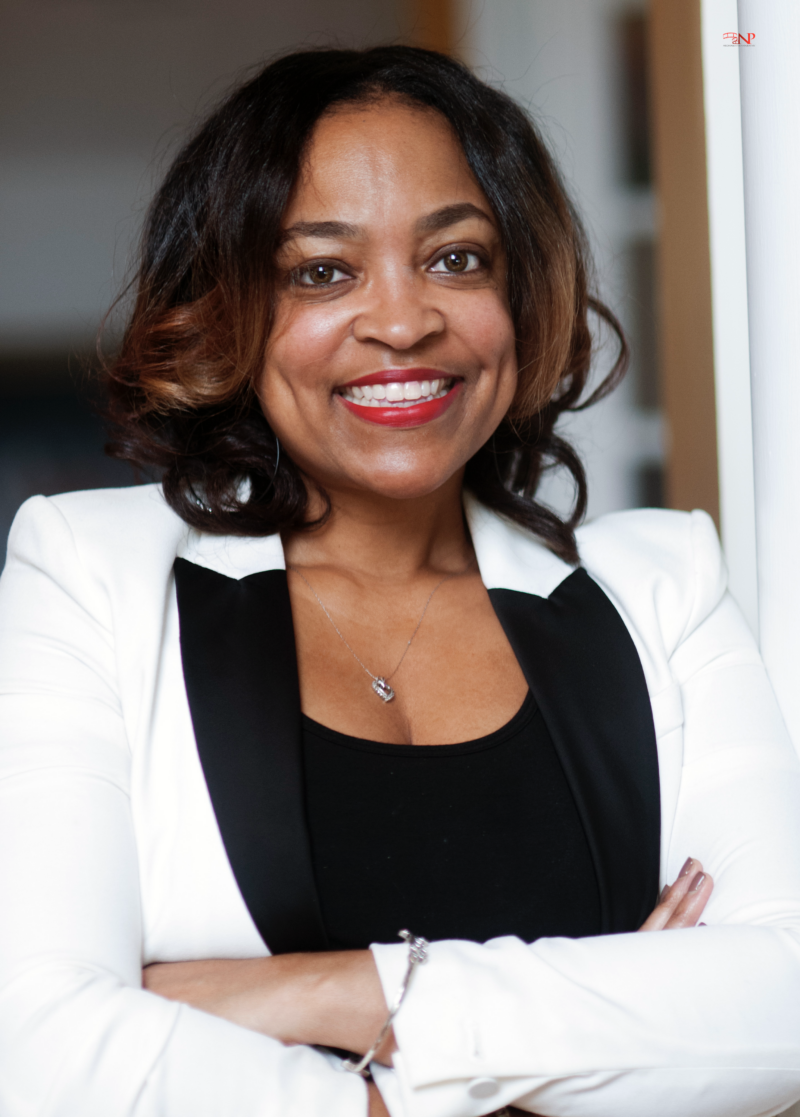
Kamela Smith, M.Ed.
Manager, Community Education and Engagement
Kamela Smith’s introduction to the Divine Nine came in high school when one of her cousins – the cool, cultured and well-traveled one, Smith remembered with a laugh – showed up to a family event wearing her Delta Sigma Theta Sorority, Inc., letters. Smith was instantly smitten with the idea of joining a group of like-minded women with a culturally relevant past and present.
“From that point I wanted to wear those letters too,” Smith said.
But her college, University of Pittsburgh, lacked Divine Nine representation. For three years, Smith and a group of friends worked in vain to bring a chapter to their campus. Although she graduated and later earned a master’s degree, Smith still wanted that Delta connection.
In 2018, her long-awaited dream finally became reality. Smith joined the Wilmington, Delaware, alumnae chapter of Delta Sigma Theta Sorority, Inc., a decision she calls one of the best she has ever made. In crossing with her line sisters, she made a lifelong commitment to stay active and connected within her community. She is currently the co-chair of the chapter’s Social Action Committee.
“Being a member of a sorority doesn’t give you an opportunity — or the space — to not push forward, be inactive or stay comfortable,” said Smith, who grew up with no sisters and now has more than she can count. “Delta is a movement not a monument, and I stand on this.”
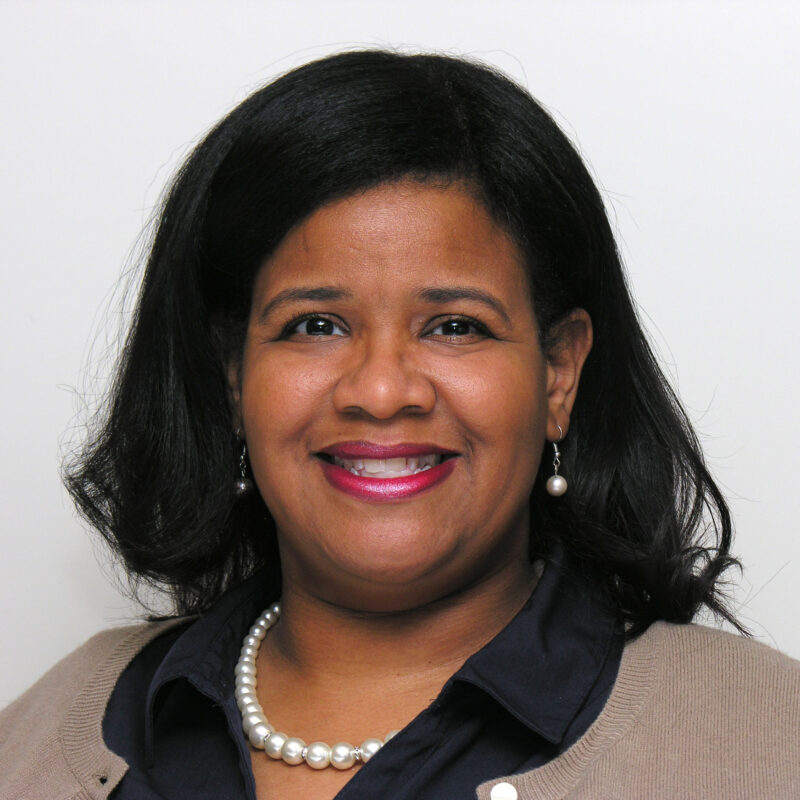
Tenisha Cameron, MBA, MHA
Director, Practice Operations, Women’s and Children’s Service Line
Tenisha Cameron approached joining a sorority much like she might buy a new car or plan a vacation — she did her research, talked to friends and made a list of favorites. But the more she learned about Zeta Phi Beta Sorority, Inc.’s reputation for supporting unity among its members and problem-solving social issues, the more she knew she had found her sisters.
Supporting organizations like March of Dimes, which has a longstanding relationship with Zeta Phi Beta, felt like an extension of the work Cameron does as a ChristianaCare caregiver.
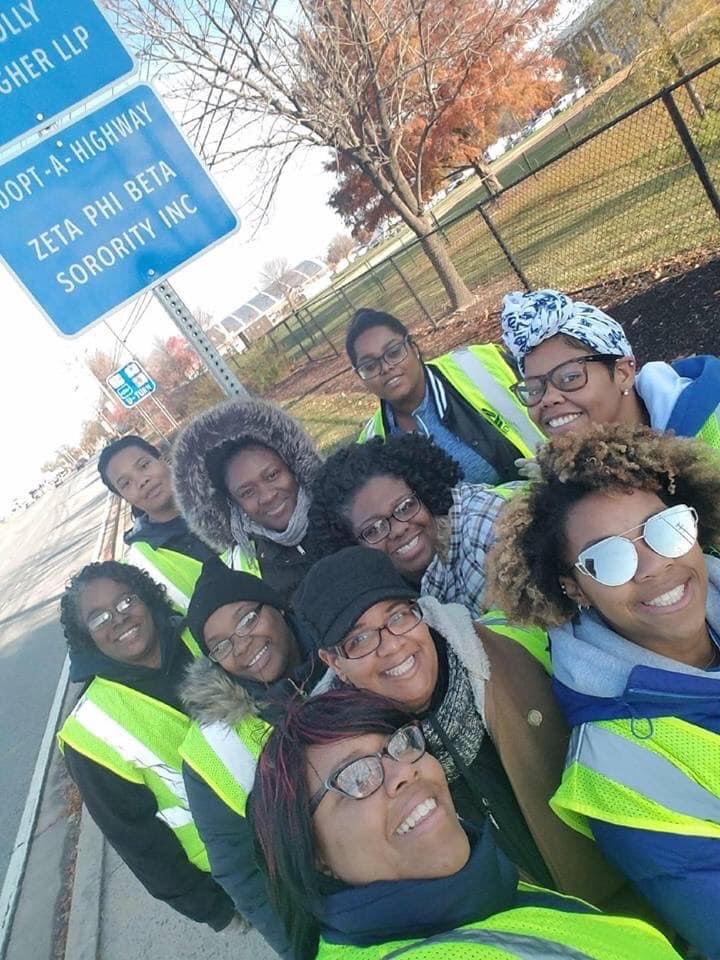
“I have always strived to help others and give back to my community, Cameron said. “To join an organization that also has these same unified beliefs and goals was a dream come true.
“I chose to become a member of the Zeta Phi Beta Sorority, Inc., because of the sisterly love and the finer womanhood it represents.”
Cameron became a member of the Epsilon Rho Zeta graduate chapter in spring 2019. As she has joined sorority networking groups, attended legislative meetings organized by the Zetas and participated in several back-to-school supply drives, scholarship fundraising and community events, she has found herself not only working hard to improve her community, but herself as well. Buoyed by the solidarity found in her strong sisterhood, Cameron said, she is able to give to others because others have given to her.
“I’ve been blessed,” Cameron said.
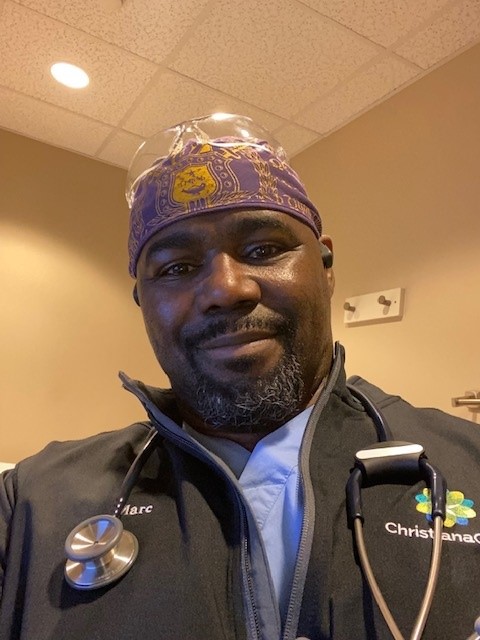
Marc Latta, DHSC, PA-C
Physician Assistant, Critical Care/Cardiac Surgery
Omega Psi Phi Fraternity, Inc.
Patients with complicated health challenges need not worry about overwhelming physician assistant Marc Latta, DHSC, PA-C. “Nothing is impossible for an Omega man,” he said with a smile.
Latta joined the Beta Phi chapter of Omega Psi Phi in March 1994 during his second year of graduate training while attending Duke University Medical School. If he wanted a reason to join, he didn’t have to look far. Two of Latta’s older cousins also were Omega brothers, and he could see their pride in displaying their fraternity gear when they were home from college.

Once he got to campus himself, Latta noticed something special about the group of men who would become his brothers.
“The most intelligent and active fraternity men on the campus were the men of Omega Psi Phi Fraternity, Inc.,” Latta said. “Their commitment to service on campus and in the community was always exemplary. Their meticulous nature, academic pursuits, and strong reputation attracted me primarily to the fraternity, followed by their noticeable bond of friendship.”
Since he crossed 29 years ago, Latta’s involvement with Omega Psi Phi has served as the foundation for his continued community service, including efforts last year to increase the number of minority blood donors in Delaware. He served as co-chairman for the inaugural Dr. Charles R. Drew health fair and blood donation drive sponsored by the Gamma Mu Nu chapter of Omega Psi Phi Fraternity, Inc. His experience as a young fraternity pledge armed him with diligence, precision, tenacity and an ability to communicate in all situations — skills highly desirable in a critical care environment.
“Most of all, membership has aligned my life values by concentrating my efforts as a liaison to the African American community,” Latta said. “The friendships gained have been numerous and instrumental in all areas of my life. These are lifelong friendships that are as strong of a bond as if they were genetic.”
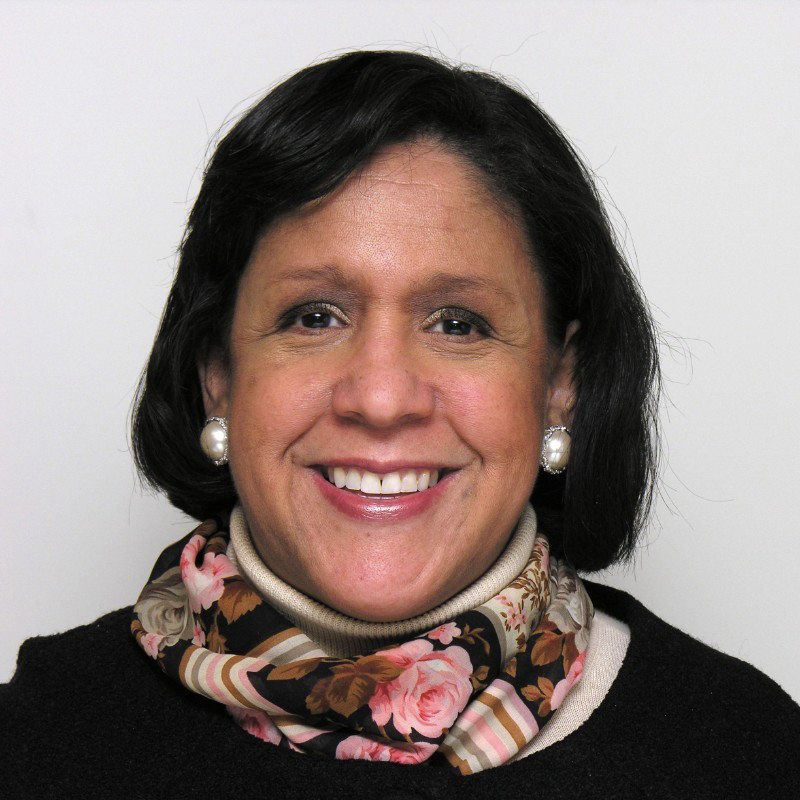
Jennifer Johnston, MA, APR
Senior marketing manager, External Affairs
Alpha Kappa Alpha Sorority, Inc.
As a member of Alpha Kappa Alpha Sorority, Inc., Jennifer Johnston is still relatively new, having crossed just seven years ago. But as a third generation AKA member — her great aunt, mother and sister have been part of the organization — the tradition is deeply engrained in her.
Johnston’s great aunt joined the sorority in the 1920s, less than two decades after AKA was founded by nine students at Howard University. Johnston’s mother joined Alpha Kappa Alpha while a student at Virginia State University in the early 1950s. Her sister also joined while in law school.
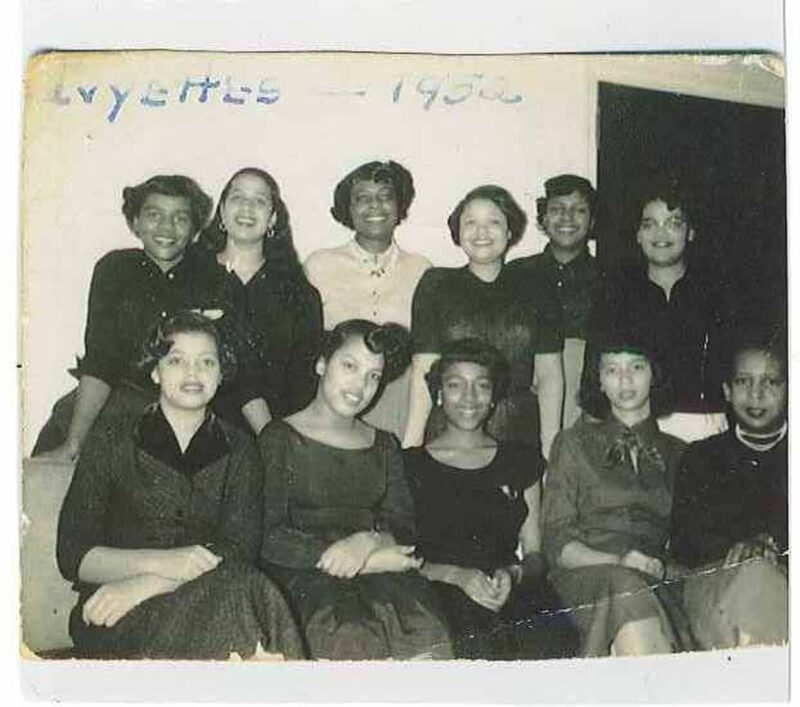
“That’s what drew me to it — my own family history. There is a commitment to sisterhood and service to our community, and at this point my life, I really wanted to give back,” said Johnston, who joined the Theta Pi Omega chapter, serving Burlington, Camden and Gloucester counties in New Jersey.
And give back Johnston has, bolstered by a community of like-minded women. The chapter’s recent service endeavors have included making blankets for a women’s shelter in northern New Jersey, making toiletry kits for homeless shelters and collecting food for children who are food insecure in Burlington County.
Indeed the chapter carries special significance for Johnston. Her mother was a charter member who helped found the Theta Pi Omega chapter. At the time, she was pregnant with Johnston, so it’s safe to say being an AKA has always been in her blood.
“I actually joined about a year after my mom passed, so she never saw me cross, which is a regret. I wish I had done it sooner,” Johnston said. “But I think she’d be proud both of her daughters became AKAs at whatever stage in life. She would be thrilled.”
